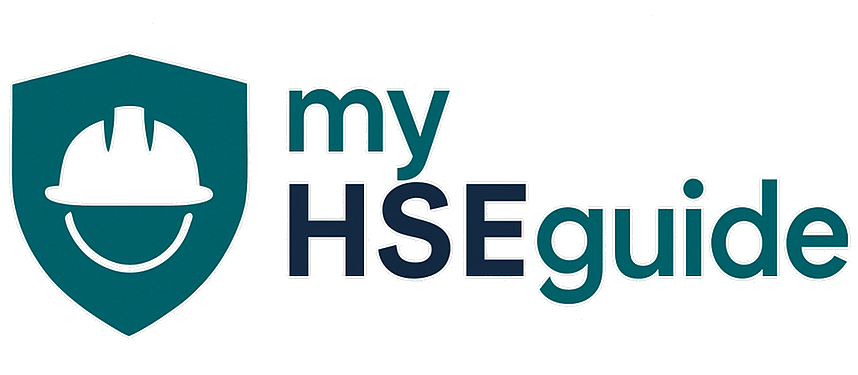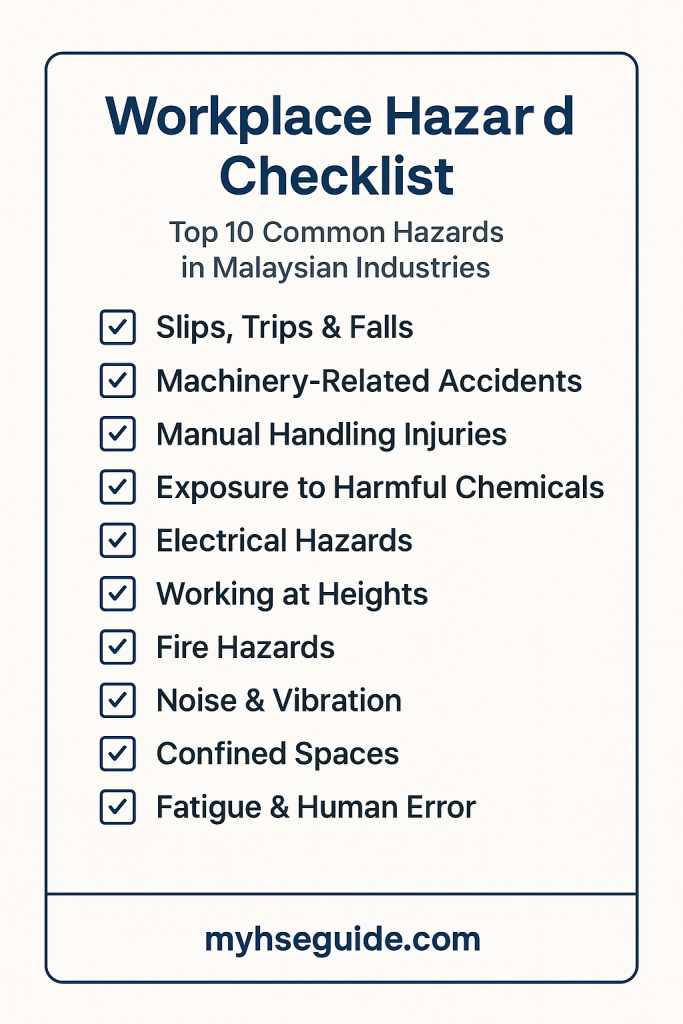
In Malaysia’s fast-growing industrial landscape — from construction to manufacturing to logistics — workplace hazards are an everyday reality. Understanding these risks is the first step toward creating a safer, compliant, and more productive work environment.
Whether you’re a safety officer, operations manager, or business owner, this guide walks you through the most common hazards and how to control them — with professional support where it matters most.
✅ 1. Slips, Trips & Falls
Hazard: Wet floors, uneven surfaces, cluttered walkways.
Impact: Minor injuries to serious fractures.
Control: Housekeeping SOPs, anti-slip flooring, warning signs.
✅ 2. Machinery-Related Accidents
Hazard: Unguarded moving parts, improper use, lack of training.
Impact: Cuts, amputations, fatalities.
Control: Guarding systems, Lockout-Tagout (LOTO) protocols, operator training.
✅ 3. Manual Handling Injuries
Hazard: Lifting heavy objects without aids or techniques.
Impact: Musculoskeletal injuries, chronic back pain.
Control: Ergonomics training, mechanical aids, task redesign.
✅ 4. Exposure to Harmful Chemicals
Hazard: Inhalation, skin contact, or ingestion of chemicals.
Impact: Respiratory issues, poisoning, long-term illness.
Control: Chemical safety training, SDS management, PPE, CIMAH compliance.
✅ 5. Electrical Hazards
Hazard: Exposed wiring, overloaded circuits, faulty equipment.
Impact: Electrical burns, shocks, fire.
Control: Regular inspections, isolation procedures, certified electricians.
✅ 6. Working at Heights
Hazard: Inadequate fall protection, improper scaffolding.
Impact: Fatal falls, severe injuries.
Control: Harness systems, edge protection, competent person training.
✅ 7. Fire Hazards
Hazard: Flammable materials, poor emergency preparedness.
Impact: Loss of property, life, and operations.
Control: Fire drills, extinguishers, ERT training, emergency response planning.
✅ 8. Noise & Vibration
Hazard: High-decibel machinery, continuous vibration exposure.
Impact: Hearing loss, hand-arm vibration syndrome.
Control: Audiometric testing, noise monitoring, PPE.
✅ 9. Confined Spaces
Hazard: Toxic gases, lack of oxygen, restricted exits.
Impact: Asphyxiation, fatal accidents.
Control: Confined space permits, atmospheric testing, rescue procedures.
✅ 10. Fatigue & Human Error
Hazard: Long shifts, high-stress environments, low awareness.
Impact: Mistakes, near-misses, poor decision-making.
Control: Job rotation, workload review, mental health support.
🛠️ Need Help Managing These Hazards?
Identifying hazards is just the start. The real challenge lies in implementing systematic, compliant, and effective control measures — that’s where PLC Group comes in.
💼 How PLC Group Can Help:
- ✅ Custom Safety Audits & Risk Assessments
- ✅ Emergency Response Training & Planning
- ✅ CIMAH & Chemical Safety Compliance
- ✅ HSE SOP & Documentation Development
- ✅ Safety Culture & Awareness Programs
📩 Ready to Make Your Workplace Safer?
Let our team of HSE experts support you in building a safer, more compliant business.
👉 Request a Free Consultation
👉 Or email us directly at: plc@plc-group.com
Stay safe. Stay compliant. Let’s make HSE a business advantage — together.
— The PLC Group Team
